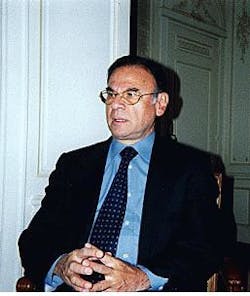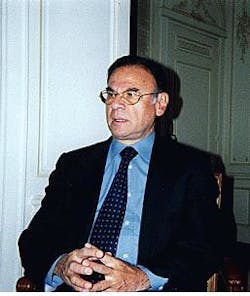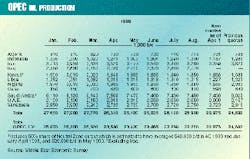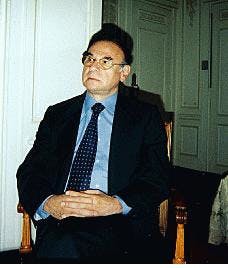Venezuelan Energy Minister discusses oil prices, shake-up in Pdvsa before OPEC meeting
Venezuela is in the midst of a campaign to reform its domestic energy policies. Among the planned changes are an overhaul of the operations of state firm Petroleos de Venezuela SA and a bid to woo foreign investment into the natural gas and petrochemical sectors.
At the same time, the country is waging a campaign to more actively participate in the Organization of Petroleum Exporting Countries. Venezuela's move to re-establish its place in OPEC began with the participation of President Hugo Chávez and Minister of Energy and Mines Alí Rodríguez Araque in a core group of leaders that forged the oil production cutback agreement between OPEC and key non-OPEC producing countries in March 1999.
Venezuela Energy and Mines Minister
Alí Rodríguez Araque
Venezuela will take "an active and positive role" in OPEC by introducing a long-term oil price management scheme that uses a price band to determine when OPEC should raise or lower oil output.
"We want to work within the oscillations of the oil industry while allowing producers to manage these oscillationsellipseIf we find another mechanism to rationalize the market, we would accept it to avoid oscillations."
More recently, Venezuela's energy industry began an internal restructuring when Pdvsa Pres. Roberto Mandini resigned and was replaced by Hector Ciavaldini. These changes were followed by the resignation of several key vice-presidents (OGJ, Sept. 6, 1999, Newsletter).
Rodríguez was appointed to his post early this year when Ch vez took office (OGJ, Feb. 8, 1999, Newsletter). Under his guidance, Venezuela's Energy and Mines Ministry has played a dominant role in setting the country's oil policy, which had been left to Pdvsa when it was under the leadership of Luis Giusti.
During a stopover in Paris the week before the Sept. 22 OPEC meeting in Vienna, Rodríguez talked with Oil & Gas Journal about world oil markets and Venezuela's role in them.
Band mechanism
Although pleased with the market's response to the March producers' agreement, Rodríguez is now touting a long-term plan for maintaining oil prices at acceptable levels. His proposed oil price management scheme involves keeping oil prices within a target band by adjusting OPEC oil output.
Signaling Venezuela's determination to resume what he calls "an active and positive role" in OPEC, Rodríguez is preparing a detailed plan for instituting the price-band mechanism. He likens the scheme to the dampeners used to adjust oil pressure in a pipeline.
This long-term oil price management system would ease the "tremendous oscillations" that have plagued the oil market since the early 1970s, said Rodríguez. He hopes it will be approved at the March 2000 OPEC meeting in Caracas.
"We want to work within the oscillations of the oil industry," he explained, "while allowing producers to manage these oscillations."
Rodríguez said the price band idea he had submitted to Saudi Arabia's Minister of Petroleum and Mineral Resources, Ali I. Naimi, who "considered it interesting," according to Rodríguez. He says he has received the same reaction from other camps.
At an August meeting of oil ministers from Gulf Cooperation Council states, some kind of intervention had been considered to "keep oil prices stable within a band between $18 and $20/bbl." However, Rodriguez declined to discuss with OGJ the meeting or the band limits mentioned there, saying the matter would be taken up with OPEC. He also conceded, "If we find another mechanism to rationalize the market, we would accept it to avoid oscillations."
Rodríguez arrived in Paris after visiting London and Norway. And upon departing Paris, he was to travel to Vienna for the OPEC meeting, then from there to Russia, Nigeria, and Senegal.
In England, the minister said he had met with Robert Mabro of the Oxford Institute for Energy Studies. Although Rodríguez did not say so, Mabro had suggested the price-band system in a paper published last year, entitled "The Oil Price Crisis of 1998." His idea has been taken up by Rodríguez and appears to be gaining strength within OPEC.
IEA opposition
While in France, Minister Rodríguez met with Robert Priddle, executive director of the Paris-based International Energy Agency.
This meeting gave Venezuela the distinction of being the first OPEC member to have been invited by IEA since it was founded, precisely to counter OPEC, in 1974.
This can be taken as a sign that relations between the two bodies have improved. "We had to meet with the largest oil consumer organization worldwide," Rodríguez told OGJ.
Venezuela Energy and Mines Minister
Alí Rodríguez Araque
"The energy ministry is working towards 'reinstituting' Venezuela's reserves, increasing light oil reserves and nonassociated gas production, and stepping up exploration, both onshore and offshore. Profitability and output must be increased."
IEA is an active participant in the producer-consumer dialogue that has taken place, albeit mostly at a technical level, since 1994.
"We understand each other," Priddle said at an informal press conference held after his meeting with Rodríguez, "but there are no negotiations."
Indeed, Priddle was very firm in his rejection of any oil market price manipulation that may have been outlined to him by Rodríguez. "The IEA is not likely to give endorsement to a policy of cutting production in order to raise prices," he said.
"No member of this agency was pleased with low oil prices, which deter investment in oil supply," Priddle said. But he repeated that he does not approve of the production cuts that led to the recent oil price rise.
Although no market is perfect, he admitted, IEA is firmly committed to being "free and open." And, contrary to Rodríguez's suggestions, Priddle said he believed there was "a long way to go before Venezuela engaged a commitment from other OPEC members" to its price-band plan.
Commenting on Priddle's remarks, Rodríguez told OGJ, "Naturally, we shall have some difference between producers and consumers, but everyone will benefit from a less volatile market."
He pointed out that consuming countries themselves have established a means of rationalizing the market by manipulating oil inventory levels.
"This is one parameter traders are taking advantage of, for they believe inventories definitely have a direct effect on price levels."
He admitted that IEA would not use inventories to set prices, "but they really do affect prices," he said. "In the end, stocks are the other producer," added Rodríguez.
That logic is firmly denied by IEA, which says stocks are not maintained in order to stabilize the market or influence prices.
Domestic upheaval
Rodríguez's multistop journey is a public relations effort designed to allay fears about the changes that are happening in Venezuela's political and economic scene in general, and in its energy sector in particular, given the recent shake-up in Pdvsa management.
Rodríguez told OGJ that these changes are not properly understood abroad.
"The changes are taking place in a very democratic manner," Rodríguez insisted. And he says there is huge support in Venezuela for the constitutional changes being undertaken.
"It is a tremendous democratic pro- cess, whether it works or not."
The purpose, he says, is to change institutions in order to adopt more democratic processes, lessen corruption, and increase efficiency. Rodríguez said the energy ministry is working towards "reinstituting" its reserves, increasing light oil reserves and nonassociated gas production, and stepping up exploration, both onshore and offshore.
Pdvsa is undergoing a complete overhaul to make it more efficient and cost effective, Rodríguez added. Its positions in projects within and outside Venezuela will be reviewed within the next 60 days, he says.
"Profitability and output must be increased," said Rodríguez. "It is possible we will take part in some ventures and reduce our stake in others."
He stressed, as he has done before, that all contracts with international oil companies will be respected.



